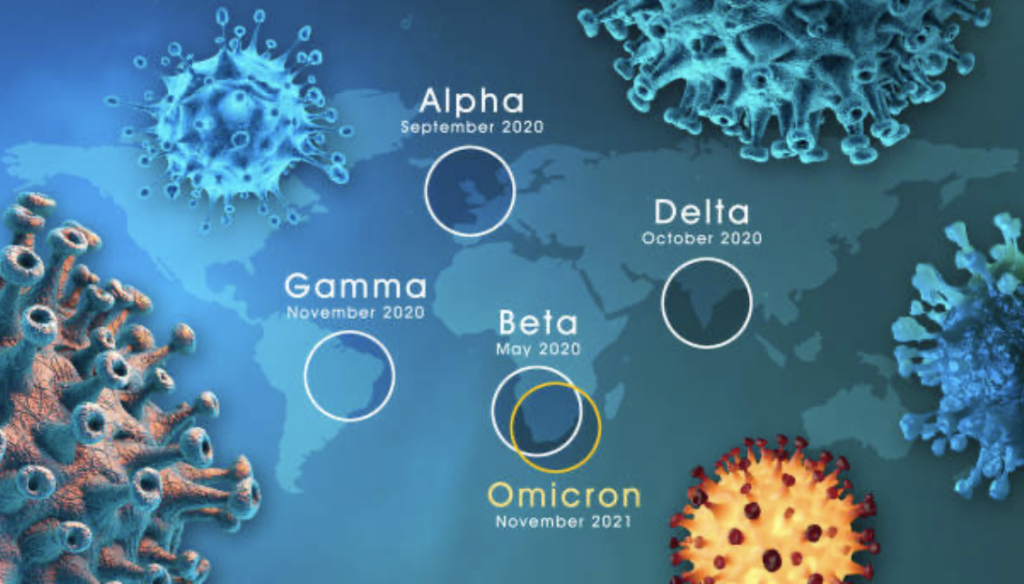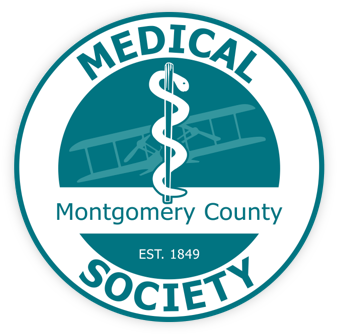News & Resources
In the Montgomery County Medical Society

Public Health Advisory issued for Omicron COVID Variant
 Provided by MCMS Administration
Provided by MCMS Administration
This is an official CDC HEALTH ADVISORY:
Distributed via the CDC Health Alert Network
December 1, 2021, 11:00 PM ET
CDCHAN-00459
New SARS-CoV-2 Variant of Concern Identified: Omicron (B.1.1.529) Variant
Summary
Omicron, a new SARS-CoV-2 variant, has been identified in many countries and categorized as a Variant of Concern by the U.S. government and the World Health Organization (WHO). Because little is known about Omicron currently, it is important for the public health and medical communities as well as the general public to remain vigilant to reduce potential exposure. This Health Alert Network (HAN) Health Advisory summarizes current knowledge about Omicron and provides recommendations on how to detect the Omicron variant within the United States as soon as possible to mitigate its spread.
Background
A new SARS-CoV-2 variant, lineage B.1.1.529, was first detected in Botswana on November 11, 2021, and South Africa on November 14, 2021. This new variant has a large number of mutations in portions of the genome that can potentially increase infectivity and transmissibility, confer resistance to certain therapeutics, and reduce neutralization by convalescent and vaccinee sera1. For these reasons, on November 26, 2021, WHO classified B.1.1.529 as a variant of concern and named it Omicron2. By December 1, the Omicron variant had been detected in at least 20 countries in addition to those in Southern Africa, including the United States, Israel, Hong Kong, Nigeria, Saudi Arabia, South Korea, Australia, Canada, the United Kingdom, and several European countries. In some countries, such as Germany and Portugal, there is evidence of community transmission of Omicron. On November 30, 2021, the U.S. SARS-CoV-2 Interagency Group (SIG), which includes the Centers for Disease Control and Prevention (CDC), the National Institutes of Health, the Food and Drug Administration, the Biomedical Advanced Research and Development Authority, and the Departments of Defense, Agriculture, and Health and Human Services, classified the Omicron variant as a Variant of Concern.
Currently, it is unknown how efficiently the Omicron variant can spread from person to person. It is unknown whether Omicron is more transmissible than other variants, but preliminary data from South Africa suggest that the mutations to the receptor binding protein of the variant virus will confer increased infectivity. Currently, there is limited information about the clinical manifestations of infection due to the Omicron variant and given the small number of identified cases attributed to the Omicron variant to date, current assessment of disease severity and response to vaccines and therapeutics is difficult. Preliminary information from South Africa indicates that there are no unusual symptoms associated with Omicron variant infection, and as with other variants, some patients are asymptomatic3. Symptoms may be milder in persons who have been vaccinated or previously infected with SARS CoV-2.
Some SARS-CoV-2 variants, including the Omicron variant, have Δ69-70 deletion in the spike (S) gene. This particular mutation leads to failure of one of the polymerase chain reaction (PCR) targets (sometimes called S-gene target failure (SGTF)) when the virus is tested with assays that include an S gene target, including the Thermo Fisher Scientific TaqPath™ COVID-19 Combo Kit diagnostic assay4. TaqPath™ tests for three proteins of SARS-CoV-2 so will still detect the virus but will fail to detect the S gene protein specifically. Such assays can be used as a screen to presumptively identify SARS-CoV-2 variants that have the Δ69-70 deletion, including the Omicron variant. Delta, currently the predominant variant in the United States, does not have this Δ69-70 deletion; therefore, infections due to Delta variant would not produce a SGTF profile.
Recommendations for Public Health Departments and Public Health Jurisdictions
Case identification and reporting
Public health departments should follow existing state guidelines for case investigations. Case investigation and contact tracing can help ensure compliance with mitigation measures, such as isolation for people who test positive, and identify close contacts for public health follow-up including testing, masking, and quarantine based on vaccination status and history of prior infection. Jurisdictions that are interested in partnering with CDC to conduct enhanced case investigation to identify and characterize initial Omicron cases in the United States should contact their CDC health department liaison officer (HD LNOs). Case investigation will enable better understanding of the characteristics of the initial cases identified in the United States and will provide data on early symptoms, vaccination status, and travel history of these infected persons. In the initial weeks, collecting data on travel history, including any international locations where the infected person was present during the 14 days before illness onset (or date of positive test if asymptomatic), will help monitor importation versus domestic community transmission. All cases should be reported to CDC through existing systems, such as Epi-Info surveys and case surveillance, and using established communication channels, such as HD LNOs.
CDC is collaborating with Xprescheck and Gingko Bioworks on a SARS-CoV-2 surveillance program that involves voluntary testing of arriving international travelers at select U.S. airports. Arriving air travelers are offered both pooled sample collection in the airport and take-home kits for saliva sampling done 3-5 days after arrival; all samples are returned to the laboratory for PCR testing. All positive samples are sequenced, enabling detection of novel COVID-19 variant strains among travelers entering the United States. On November 28, 2021, the program began expanding to test air travelers entering the United States from Southern Africa, including passengers making connections through Europe.
Recommendations for Laboratories
Surveillance
Laboratory testing is a critical component of public health response to and surveillance of emerging variants, including the Omicron variant. The presence of the SGTF profile can signal the need for sequencing to characterize the variant in that specimen. Consideration of epidemiological factors, including recent travel history, for patients who test positive for SARS-CoV-2 can also indicate that a specimen should be prioritized and sent to CDC for sequencing.
In partnership with U.S. public health laboratories and the Association of Public Health Laboratories, CDC has implemented enhanced surveillance for specimens with SGTFs and specimens with sequencing data available that indicate a mutation profile resembling Omicron. CDC requests that public health laboratories send SGTF specimens or specimens that are possible Omicron variant by sequencing to CDC through National SARS-CoV-2 Strain Surveillance (NS3) ES21-01 (SGTF) and ES21- 03 (specimens with sequence data available) as quickly as possible for rapid confirmation of presumptive Omicron cases and subsequent virological characterization.
Delta variant specimens do not yield an SGTF result using the TaqPath COVID-19 Combo Kit. Given that nearly 100% of viruses circulating in the United States are the Delta variant, specimens with an SGTF using this diagnostic test may be presumptive Omicron variants and should be prioritized for sequencing confirmation. There are other lineages that may contain the Δ69-70 deletion and give the SGTF profile, such as the Alpha variant which is uncommon currently but was predominant in the United States earlier this year.
Recommendations for Healthcare Providers
Clinical diagnosis and treatment
Early reports are that the clinical signs and symptoms of COVID-19 from infection with the Omicron variant are similar to those of other variants and may also be absent (asymptomatic). As CDC and public health officials work to identify cases of COVID-19 with the Omicron variant, it is important to take a travel history for all suspected or confirmed COVID-19 cases. If the case is confirmed and there is a history of international travel within 14 days before symptom onset or positive test (if asymptomatic), the local health department should be notified about the travel history. Health departments should also be notified about household contacts or close contacts of individuals who are confirmed to have the Omicron variant.
The utility of travel history to identify Omicron cases will likely decline as domestic community transmission becomes more prevalent. With low levels of domestic community transmission, travel history may be a good screening tool to identify cases of possible Omicron.
There are no data yet available about the effectiveness of monoclonal antibodies and antiviral therapies (e.g., molnupiravir) against the Omicron variant. Whether severity of disease due to Omicron will differ from that of disease caused by other variants is currently unknown. At this time, CDC recommends providers continue to closely follow NIH treatment guidelines for COVID-19.
Recommendations for the Public
Mitigation
Layered prevention strategies should be used to reduce the transmission of SARS-CoV-2, including variants such as Delta and Omicron. These strategies include vaccination, masking, improving ventilation, distancing, handwashing, and testing to slow SARS-CoV-2 transmission. CDC recommends that everyone ages 2 years or older wear masks in public indoor places in areas of substantial or high transmission. Unvaccinated people should wear masks regardless of community transmission level. Masks are required in indoor areas of public transportation conveyances and U.S. transportation hubs independent of vaccination status. Persons who have a close contact with someone who has COVID-19, you should get tested 5-7 days after exposure (even if they are asymptomatic) and wear a mask indoors in public for 14 days following exposure or until their test result is negative. Persons who develop symptoms of COVID-19 should get tested and stay home until their test result is negative; persons who have a positive test result should isolate at home for 10 days.
Vaccination
Vaccination remains vital to COVID-19 pandemic control. The COVID-19 vaccines approved or authorized in the United States are highly effective at preventing severe disease and death from the Delta variant, which is currently the dominant variant circulating in the U.S. CDC recommends that everyone ages 5 and older should be fully vaccinated against COVID-19 as soon as possible. In addition, CDC recommends all persons age 18 years and older receive a booster dose at the recommended interval. CDC will provide updates as soon as more information is available about vaccine effectiveness against the Omicron variant.
For More Information
- National SARS-CoV-2 Strain Surveillance
- For questions or concerns about specimen shipment or sequencing, please email: eocevent506@cdc.gov.
- For more information about SARS-CoV-2 surveillance program at select airports, please email: eocevent221@cdc,gov
References
1. SARS-CoV-2 Interagency Group, Situation Report for B1.1.529 – November 28, 2021.
2. https://www.who.int/news/item/26-11-2021-classification-of-omicron-(b.1.1.529)-sars-cov-2- variant-of-concern
3. Frequently asked questions for the B.1.1.529 mutated SARS-CoV-2 lineage in South Africa – NICD
4. https://www.thermofisher.com/us/en/home/clinical/clinical-genomics/pathogen-detection-solutions/covid-19-sars-cov-2/multiplex.html
The Centers for Disease Control and Prevention (CDC) protects people’s health and safety by preventing and controlling diseases and injuries; enhances health decisions by providing credible information on
critical health issues; and promotes healthy living through strong partnerships with local, national, and international organizations.
Additional Information
To read additional information about this, please view the CDC’s website here: https://www.cdc.gov/coronavirus/2019-ncov/variants/omicron-variant.html